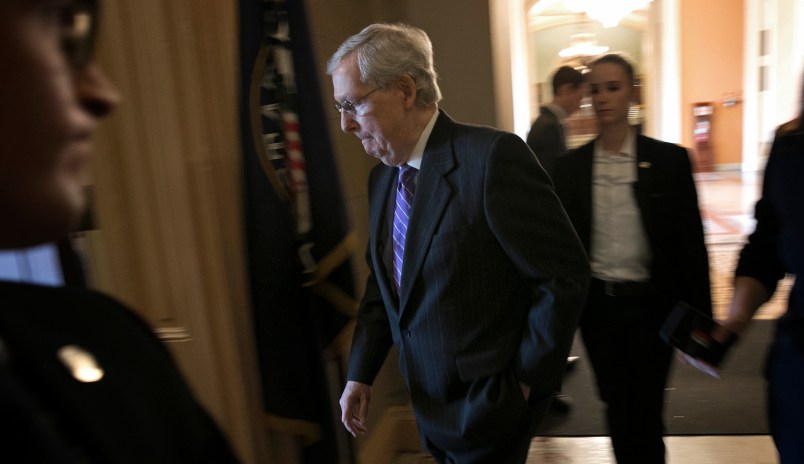A pair of competing Senate bills to reopen the government failed to pass on Thursday, the latest non-starter attempts to fall short as the government shutdown stretches into its 34th day. But a half-dozen Republicans defected from their party to vote with Democrats, a sign of a growing split between President Trump and his party’s more institutional wing.
The votes were the first time the Senate has actually voted on the shutdown since it began in late December. And while the Democratic bill was nowhere near passing, the decision by a half-dozen Republicans to split with their party was a sign that the growing pressure on the GOP may be shifting down-ballot Republicans away from their president.
The GOP bill to fund the government and finance Trump’s border wall got just 50 votes with 47 voting against, far short of the 60 needed. A Democratic bill to reopen the government through Feb. 8 without any strings attached failed as well, but got significantly more crossover support, winning 52 votes with 44 against. Sens. Lamar Alexander (R-TN), Susan Collins (R-ME), Cory Gardner (R-CO), Johnny Isakson (R-GA), Lisa Murkowski (R-AK) and Mitt Romney (R-UT) all bucked Trump to vote with the Democrats.
There were also more GOP defections than Democratic ones on Republican bill that included wall funding. Sen. Joe Manchin (D-WV) was the only Democrat to vote for it. Sen. Tom Cotton (R-AR), an immigration hardliner and normally a close Trump ally, voted against the bill from the right. Libertarian-leaning Sen. Mike Lee (R-UT) also opposed it.
The GOP bill would have funded Trump’s wall and dramatically limited the ability of refugees to apply for asylum. That bill also offered temporary protections for DACA recipients and refugees currently living in the U.S. in an attempt to woo Democrats.
Following the votes, Sen. John Thune (R-SD), the No. 2 Republican in the Senate, told reporters that he hopes party leaders will now negotiate a deal to open the government “in an earnest way.”
“These votes, I think, put the pressure on both sides to meet,” Thune said.
Some GOP lawmakers were hopeful before the votes as well, as a bipartisan group of senators began to negotiate a way to end the partial shutdown.
“Hopefully we can find some kind of third approach. There’s a dozen of us, maybe more… talking about finding a way to find a short-term CR [continuing resolution] acceptable to the president,” Sen. Lindsey Graham (R-SC) told reporters before the vote, saying lawmakers were looking for a “bipartisan piece of legislation added to a short-term CR” that could get support.
But what Trump might be willing to accept is the big question. The President has so far refused to entertain any offers to reopen the government that doesn’t include funding for the border wall.
Democrats were incredulous, wondering how the compromise in the works was much different than the bill most Republicans opposed.
“Well, that sounds a lot like what Sen. Schumer is proposing, right?” Sen. Richard Blumenthal (D-CT) told TPM before the votes.
Graham, who met with Trump earlier this week, said the president “feels like he’s moved and they haven’t, so to get a short-term CR I think you’d have to show some movement on their part that would be seen as legitimate.”
But Trump has essentially refused to negotiate with Democrats since he unilaterally floated what he billed as a compromise last weekend.
Senate Minority Leader Chuck Schumer (D-NY) said support for the GOP plan amounted to “an endorsement of government by extortion.”
Lawmakers in both parties seemed increasingly fed up with the ongoing shutdown ahead of the Thursday afternoon votes.
Normally mild-mannered Sen. Michael Bennet (D-CO) took Sen. Ted Cruz (R-TX) to task on the Senate floor before the vote, accusing him of “crocodile tears” for saying he cared about government workers when he was a leading cause of the last major government shutdown.
And Sen. Rob Portman (R-OH), part of the bipartisan rump group, sounded fed up as well.
“Shutdowns are always stupid. This is a particularly stupid one because the underlying problem is one we can resolve. We’re not that far apart,” he said.







So it’s the “institutional” Republicans vs. the “should be institutionalized” Republicans.
47 Democrats + Six Republicans=53. By my math, a Democrat didn’t vote on the Democratic bill. Who was it?
Yay. Comments finally working again.
I love that the Dem bill actually got more votes. LOL
Good question. i was wondering that myself
ETA: Twitter says Rosen didn’t vote (along with Rand and Risch
Can someone tell me what liberal bill Manchin would vote for?